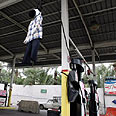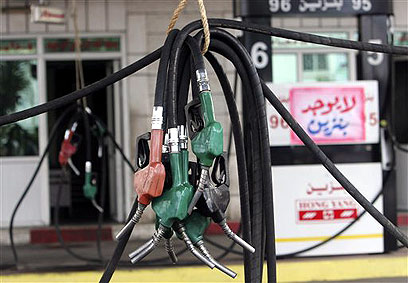
Fuel crunch adds to misery in Gaza
Month-old Israeli reduction in fuel shipments to Strip hitting seaside territory hard: Service stations have shut off their fuel nozzles, tens of thousands of people have no fresh water because pumps can't run. 'One time there is no electricity. Then no water, or no wheat. It can't get more unjust,' resident says
Service stations across the Gaza Strip shut off their fuel nozzles. Tens of thousands of people have no fresh water because pumps can't run. Hospitals parked ambulances, and bicycles are the new favored form of transportation.
A month-old Israeli reduction in fuel shipments to Gaza is hitting the seaside territory hard. And things could get worse — seeking to punish Gaza's Hamas rulers further, Israel is waiting for court approval to reduce the electricity supply as well.
The measures are the latest in a series of sanctions that Israel has imposed since the Islamic militant group violently seized control of Gaza in June and allowed near daily rocket attacks on Israelis. Israel, which considers Hamas a terrorist group, has declared Gaza a "hostile entity" and closed the borders, halting almost all trade.
Gaza's woes pose a major challenge to Hamas as it clings to power amid renewed peacemaking between Israel and the moderate Palestinian administration based in the West Bank. While firmly in control of Gaza, Hamas is casting a long shadow over next week's scheduled launch of formal peace talks following seven years of violence.
Gaza relies on Israeli suppliers for all its fuel and 60 percent of its electricity.
The gasoline and diesel reductions, from 15 percent to 75 percent of normal supplies, have hit Gaza's water system as pumps run out of fuel. The shortages have been compounded by Gaza's 30 private fuel companies, which halted deliveries this week to protest the Israeli cutback.
Fed up with the finger pointing, Gaza's gas station owners this week stopped serving the public, saying they were caught in the middle.
Gas pumps were covered in blankets, plastic bags or signs declaring: "No fuel. No diesel."
"We are the ones who are suffering the beating and the losses," said Mahmoud al-Shawa, a member of Gaza's association of station owners.

'No fuel. No diesel' (Photo: AP)
Late Thursday, the station owners decided they would reopen after accepting some supplies from Israel, said Mahmoud Khazoundar, chairman of the owners union. It was not immediately clear what led them to change their minds.
The hardships aren't just for drivers.
"We have lost everything we gained," said Hassan Abu Eissa of Wadi Gaza, a village of 6,000 in the central Gaza Strip where a water pump sits idle for lack of fuel.
Sabha al-Sawarka, 64, said she sends her grandsons to fill containers with water from a nearby agricultural well. "It is a bit salty, but what can we do?" she said. "One time there is no electricity. Then no water, or no wheat. It can't get more unjust."
Living in an impoverished area accustomed to violence and an overtaxed infrastructure, Gazans are used to temporary disruptions, and many homes have generators and battery-operated equipment. But rarely have shortages been so widespread or lasted so long.
Five water wells that rely on diesel-operated generators have stopped running, cutting off water for more than 77,000 people, according to Gaza's water utility. Three others that serve crowded Gaza City neighborhoods regularly shut down for lack of fuel and spare parts.
The aid group Oxfam International has warned that 225,000 Gazans could soon suffer from inadequate water supplies because of the fuel shortage, raising concerns for public health.
The fuel crunch has amplified the problems caused by the sanctions, which Israeli officials say are a response to rocket and mortar attacks that Palestinian militants fire at southern Israel nearly every day.
With exports and most imports halted, factories have closed, construction has halted and store shelves are empty. Government officials believe the poverty rate has jumped to 75 percent, up from 65 percent last summer.
'Everyone is using us as bargaining chips'
Before the fuel cuts took effect, hospitals scrambled to collect fuel and drastically cut back on ambulance services and transportation for medical staff. Private clinics called off home visits.
One school said it is no longer picking up students because it has no diesel for its minibuses.
The Hamas rulers accuse the rival Palestinian government of President Mahmoud Abbas in the West Bank of encouraging the fuel cuts by refusing to pay utility bills. The West Bank government, formed after Hamas seized Gaza, denies it.
Israel says Hamas is responsible for bringing hardship to Gaza.
"The Israeli policy is clear: You cannot have business as usual with the Gaza Strip as long as you have daily volleys of rockets and mortar shells from Gaza targeting our civilian population," said Israeli government spokesman Mark Regev.
He added that Israel is committed to "continuous humanitarian support" for Gazans, alluding to the basic foods and medicines that Israel allows into Gaza.
Dor Alon, the Israeli company that provides Gaza's fuel, said its deliveries comply with government orders. "We supply all the (fuel) that we are supposed to, considering the government decision," said company spokeswoman Tal Katz.
During a recent protest against the fuel cuts, some 300 motorists brought traffic to a halt for a half hour around two major streets in Gaza City.
"Everyone is using us as bargaining chips — the government and the (service station owners) association," said Moussa Ayad, a 24-year-old taxi driver. "In the end, the victim is the citizen and the driver."
The United Nations has asked Israel to resume full fuel shipments and expressed concern about the station owners' protests. And Israeli human rights groups went to court trying to block the sanctions.
"These cuts are designed to gradually and deliberately decrease the level of economic and humanitarian activity that can take place in Gaza at the expense of 1.5 million people who have no way to defend themselves," said Sari Bashi, director of Gisha, one of the rights groups.
Israel's Supreme Court upheld the fuel sanctions last week, ruling that they would not cause critical humanitarian damage. But the court ordered the government to postpone the electricity cut, demanding more details on how Gazans would be affected.










